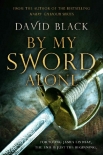By My Sword Alone by David Black (best e books to read .TXT) 📗

- Author: David Black
Book online «By My Sword Alone by David Black (best e books to read .TXT) 📗». Author David Black
Throughout the day the two men had followed Chapuis’ every move as he deployed his men on the snowy plain on far side of the Sasper See. It had been like watching an invisible hand play toy soldiers on a bed sheet.
They had complimented Chapuis on the precision of his drill as he marched his troops up to face the enemy, on a two regiment frontage in three ranks. But then, their admiration had waned and they were consulting their timepieces. Chapuis took his time, pacing the spaces between each company and battalion, dressing the lines, then dressing them again, then marching the colours to the front and then calling forward the fifes and drummer boys. And in all that time, the French fusiliers had not moved one step forward.
Then it had been time to roll out the three cannon, one on the left flank, one on the right and one between the regiments. The little match-like figures that had started running forward, James recognised as the skirmishers Chapuis had borrowed from one of von Bittinghofen’s Polish militia battalions, obviously being thrown towards the Saxon trenches to cover their cannon.
It had been mid-afternoon before they saw the first puff of smoke billow from one of those French artillery pieces, signalling that the action had commenced, the distance too far however for them to hear any report. The paltry cannonade did not last long. Then the grey-white lines of French fusiliers began to move, their colours like tiny white and gold smudges preceding them. Mounted officers, too. Then they came to a halt, and the colours and the mounted officers dropped back into the solid block of each regiment. Everything looked frozen, like a painting, until a sudden wave of white smoke erupted all along their French line and the fusiliers who had just fired marched into it, and were lost. The powder smoke from their muskets clung to the ground in the windless air, like a strand of cotton wool stretching out towards the coast. That events were unfolding within it was all too apparent from the way it seemed to wheeze and convulse every three or four minutes, as each succeeding volley of fire added to its volume.
And then it was over.
At first it was only a few tiny, stick-like figures lurching from the smoke; then they came in confused gaggles, streaming away; eddies of grey-white uniforms, some like clots around the colours, with the officers on their horses, turning and wheeling like ineffectual dams trying to stem the flow.
Chapuis had been the first back across the Mottlau river, and into General von Bittinghofen’s forward headquarters in the Weichselmünde fortress. He had raged across its hall, denouncing all and sundry as he went. First, it was the general’s worthless uhlans who were to blame.
‘They said they had reconnoitred the earthworks … mere scrapes in the ground, they said!’ Chapuis roared.
Von Bittinghofen’s uhlans had reconnoitred the earthworks, but they had not described them as ‘mere scrapes in the ground’.
‘I found parapeted trenchworks worthy of Vauban!’ Chapuis ranted. ‘They said I faced only a tired regiment of foot, exhausted after their march from low Germany! I faced a brigade at least, maybe even a division!’
He said that when it came to estimating an enemy force, von Bittinghofen’s ‘blind peasants’ were only good for, ‘tallying a sow’s litter!’ He then accused them of treachery; of lying to lure his fusiliers to their destruction. That was when von Bittinghofen’s low, steely-edged warning about who Chapuis was trifling with had hit home. The Frenchman, forced to give pause when it came to insulting the honour of Polish uhlans, began venting his spleen along another axis.
At least, he declaimed, his attack had achieved something the Poles had been incapable of so far; demonstrating beyond doubt that the enemy’s encirclement of Danzig was now complete.
‘So here is a message for you, general! Paid for in my men’s blood!’ he railed on. ‘Your position is now untenable! The Russians are free to bring up their siege train, their big smashers, and they are going bombard you into dust. You have lost, m’sieur general, and so has your so-called Polish king! Once my men are back across the river, we are embarking and sailing away from this, this, prison!’
The next morning, while Chapuis’ men began forlornly filing back up the gangways onto Achille and Gloire and the worn-out rented transports, James had himself rowed back upstream to Danzig. He found the city in ferment. One of the first to accost him on his way to make his report to King Stanislas’ aide was the rodent-featured French minister, the Marquis de Monti.
‘I have Chapuis’ dispatch in my hand!’ he whined. ‘How can it be? How can it be?’
The Frenchman was waving several sheets of vellum. James eyed them incredulously; how could that wretch Chapuis have penned such a detailed document and had it here in the city so quickly? Obviously, there were circumstances where he indeed was capable of speed and manoeuvre.
‘How is it he was sent off to face the entire Saxon army, alone?’ begged di Monti. ‘He swears the Poles knew, yet let him march to his death! Have we been betrayed, chevalier? Has France been betrayed?’
James sighed, and turned to face the wheedling diplomat, whose Quai d’Orsay sangfroid had so totally deserted him. The little Frenchman recoiled before James’ hard stare, yet with a defensive flourish he added, ‘He says the Saxon army is advancing on the city as we speak.’
But his voice trailed away when he saw his words were having no impact; so that his final bleatings were delivered without conviction. ‘And they are intent





Comments (0)